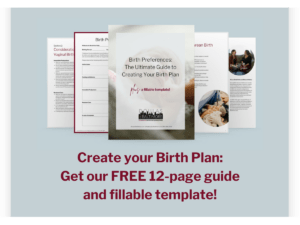With a sea of baby monitor options, it’s easy to feel like you’re drowning. The Nanit Pro Camera was named NYT’s Wirecutter Best wifi video monitor so it’s not surprising the name surfaces at the top! With promises of advanced tracking, lowered anxiety, and crystal clear images, parents often wonder, “Is the Nanit Pro Camera the best baby monitor?”. Let’s break down what it is, the pros and cons, and our final opinion.
What Exactly is the Nanit Pro Baby Monitor?
The Nanit Pro is far more than just a camera you point at the crib. It positions itself as a “do-it-all”, high tech nursery hub that includes an app connected to your phone that is analyzed by AI to offer you insignts into your baby’s growth, sleep, and development. Here’s the core idea:
With a high definition camera it streams crystal-clear 1080p HD video and audio to your smartphone (iOS/Android) or tablet, day or night (thanks to excellent night vision with illuminating LEDs). Unlike tabletop monitors, the Nanit is designed to be securely mounted above the crib (or on a floor stand), giving a top-down, unobstructed view of the entire sleep space. This perspective is key to its advanced features.
The big selling point for Nanit is its AI-powered analytics. Using sophisticated computer vision (no wearable sensors needed!), it analyzes your baby’s movements and sleep patterns. This data is then added to the Nanit app where you can also watch the live stream and receive alerts. The camera comes with a 6 month free trial to Insights which is important in unlocking the full power of the analytics (sleep tracking, trends, personalized tips). After that, it is a paid subscription with mixed reviews.
In short: The Nanit Pro is a premium, wall/ceiling-mounted smart baby monitor that uses AI to not just show you your baby, but to help you understand their sleep patterns and development.
Is the Nanit Pro Baby Monitor Safe?
We’ve all heard the stories of baby monitors being hacked on the internet. Safety has to be a top priority when it comes to baby monitors, especially internet-connected ones.
Online Safety
According to Nanit, all video streams and data transmitted between the camera, Nanit’s servers, and your app are encrypted using industry-standard protocols (TLS/SSL). This makes it extremely difficult for unauthorized parties to intercept. Additionally, access to your camera feed requires logging into your Nanit account with your credentials. Two-factor authentication is highly recommended and adds a significant extra layer of security. Unlike some older monitors, the Nanit stream isn’t discoverable on the open internet. You must be logged into your specific account.
Nanit Pro Camera Safety
Physical safety is also important, nobody wants a camera falling into the crib! The provided mounting system is excellent when installed correctly according to instructions. Like all items, ensure it’s securely attached well out of baby’s reach.
When it comes to privacy, there are also many features. The Nanit Pro has a physical, sliding shutter you can close when the camera isn’t in use, physically blocking the lens if you choose. There is also an audio-only mode where you can choose to stream only audio for times when video isn’t necessary. Privacy zones are able to blur chosen areas within the camera’s view in the app.
Data Safety
When it comes to your private data, Nanit states they prioritize user privacy. While sleep data is processed to provide insights, they claim not to sell personal user data to third parties. We suggest you review their Privacy Policy for full details.
The Verdict on Safety and Privacy: Nanit takes security and privacy seriously, employing strong industry-standard measures. No system is 100% unhackable, but Nanit is considered one of the more secure options. Practicing good security practices that you’d use for any online data (strong, unique password, enabling 2 factor authentication, closing the shutter when not in use) further minimizes risks. To date there haven’t been major, widespread security breaches reported for Nanit.
What Are the Benefits of Using the Nanit Pro?
This isn’t an inexpensive device and there are many options out there that offer video directly to your phone. What sets Nanit apart?
Nanit App
Personalized insights do require a premium subscription (a new device comes with a 6 month free trial) and reviews overall are mixed on whether it’s worth if or not. Some parents say these premium features helped their peace of mind while others say there’s no point. Nanit accurately and automatically tracks when your baby falls asleep, wakes up, and duration of sleep sessions/naps. For data nerds and new parents alike, these are excellent details and can also work well for those who are sharing night duties with their co-parent, family, or Postpartum Doula.
Data collected can create charts and graphs over time (nights, weeks, months) identifying patterns, regressions, and improvements. These can help you understand total sleep, night wakings, nap consistency, and sleep efficiency. Nanit also offers data-driven suggestions tailored to your baby’s age and sleep patterns to help improve their sleep (and yours!).
Using a special patterned band worn on baby’s pajamas or sleep sack Nanit can monitor breathing motion and alert you if no motion is detected for a set period (e.g., 20 seconds). Some parents find this helped their peace of mind.
Nanit Pro Baby Monitor Camera Features
The top-down, wall-mounted view eliminates blind spots and gives a perfect view of the entire crib. 1080p HD video is sharp, and the night vision (with its own LEDs) is among the best.
The camera also features two-way audio that allows you to talk and soothe your baby clearly through the app. The audio stream can continue playing on your phone even when the app is minimized or your screen is off. You can also choose to be notified on your phone if your baby is crying or there’s significant movement.
With other features like temperature & humidity sensor, nighlight & white noise, and multi-user access, Nanit Pro offers a host of features that many parents will find useful.
The Bottom Line: The Nanit Pro Camera is an exceptional, feature-rich smart baby monitor for parents who value deep sleep insights, top-notch video quality, and high-tech peace of mind. The AI-powered sleep analytics (via the Insights subscription) are a great feature if you’re data-driven and want to analyze your baby’s sleep without manual recording.
What Should I Consider Before I Purchase?
Before making a purchase, it’s important to consider how it might impact your family! We think you should consider the following items before diving in:
The first is the price. This camera is a significant investment, both for the hardware and the required Insights subscription for full functionality. On the topic of Insights, the best features (sleep tracking, breathing monitoring alerts, personalized tips) live behind a paywall. This increases the overall cost of the device as you’ll need to factor in the ongoing fees.
The camera also requires installation (drilling for wall/ceiling mount). This is not ideal for renters or those who want portability as the primary setup. While travel mode does exist, it adds limits to the function of the camera and may impact the data collected.
The final thing to consider in our opinion is the limitations of generalized sleep suggestions. While an app may be able to use an algorithm to deliver you a set of suggestions, there truly isn’t anyhing that can replace an expert’s touch when it comes to addressing sleep or safety concerns.
Let’s put a bow on this! If you want the most advanced insights into your baby’s sleep and well-being and prioritize crystal-clear monitoring with strong security, the Nanit Pro Camera is a great option. For simpler, audio-only monitoring or basic video, it’s overkill. It also lacks the personalized touch of a sleep expert and the promise of “eliminating sleep training” seems a little far-fetched. If you want a high-tech partner in navigating baby monitoring, the Nanit delivers impressively.


